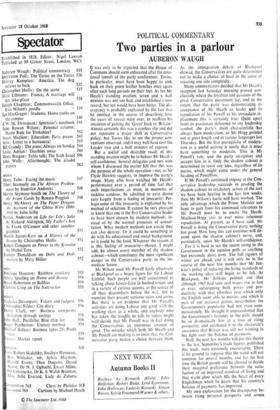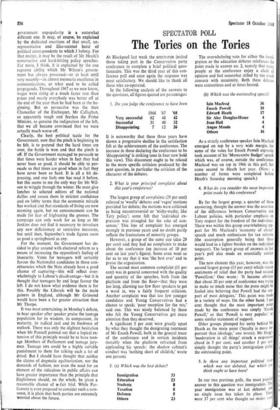Two parties in a parlour
POLITICAL COMMENTARY AUBERON WAUGH
tt was only to be expected that the House of Commons should seem exhausted after the emo- tional tumult of the party conferences. Tories, in particular, must have been happy to sink back on their green leather benches once again after such long periods on their feet. As for Mr Heath's standing ovation, seven and a half minutes was not too bad, and established a new record, but ten would have been better. The dis- crepancy is probably explained by the fact that he omitted, in the course of describing how the years of retreat were over, to reaffirm his intention of putting the 'Great' back in 'Britain.' Almost certainly this was a careless slip and did not represent a major shift in Conservative policy, but Tories like to see the proper con- ventions observed, and it may well have cost the Leader two and a half minutes of rapture.
But a useful and desirable result of this standing ovation might be to bolster Mr Heath's self-confidence. Several delegates and MPS with whom I discussed the matter felt that this was the purpose of the whole-operation—not, as Sir Clyde Hewlett suggests, to improve the party's image. Many who have watched Mr Heath's performance over a period of time feel that such imperfections as must, in moments of reckless candour, be admitted to exist derive very largely from a feeling of insecurity. Per- haps some of this insecurity is explained by his method of selection. It cannot be very pleasant to know that one is the first Conservative leader to have been chosen by modern methods, in- stead of by the normal processes of consul- tation. What modern methods can create they can also destroy. Or it could be something to do with his educational and social background, or it could be the food. Whatever the reason. it is this feeling of insecurity—shared. I might add, by almost every member of the shadow cabinet—which constitutes the most significant danger to the Conservative party in the im- mediate future.
Mr Wilson used Mr Powell fairly effectively at Blackpool as a bogey figure for the Labour faithful. Such people are well accustomed to talking about laissez-faire in hushed voices and in a variety of curious accents, as the source of all their discomforts before the war, not to mention their present varicose veins and corns. But there is no evidence that Mr Powell's activities are doing Labour any good with the working class as a whole, and anybody who has taken the trouble to talk to voters might well decide that Mr Powell was in fact doing the Conservatives an enormous amount of good. The mistake which both Mr Heath and Mr Powell are making is to insist that the Con- servative party makes a choice between them. As the immigration debate at Blackpool showed, the Conservatives are quite determined not to make a choice, at least in the sense of rejecting one side completely.
Many commentators decided that Mr Heath's reception last Saturday morning proved con- clusively where the loyalties and passions of the great Conservative movement lay, and to the extent that the party was demonstrating its
acceptance of Mr Heath as leader and its repudiation of Mr Powell as his immediate re- placement this is certainly true. Quite apart from its passionate deference to any leadership symbol, the party's main characteristic has always been moderation, as Mr Hogg pointed out at great length and in various languages last Thursday. But the first prerequisite of modera- tion as a useful activity is surely that it must have something to moderate. This is Mr Powell's role, and the party recognises and accepts him in it. Only the shadow cabinet is determined to resist any idea, regardless of its merits, which might come under the general heading of Powellism.
If Mr Powell's continued sniping at the Con- servative leadership succeeds in goading the shadow cabinet to retaliatory action of the sort we have been hearing in the last few weeks, then Mr Wilson's tactic will have worked. The only advantage which the Prime Minister can hope to gain from his continued references to Mr Powell must be to excite the Heath- Macleod-Hogg axis to ever more vehement repudiation. At present, as I have said, Mr Powell is doing the Conservative party nothiqg but good. How long this can continue will de- pend upon the shadow cabinet's nerve, and, particularly, upon Mr Heath's self-confidence.
For it is hard to see the recent swing to the Government in the opinion polls as anything but extremely short term. The full rigours of winter are ahead, and it will only be in the course of the next few months that Mr Jen- kins's policy of reducing the living standards of the working class will begin to be felt. At Blackpool, Mr Jenkins pointed out that although 1967 had seen real wages rise as fast as ever, outstripping both prices and pro- ductivity with that effortless ease which only the English seem able to master, and which is part of our national genius, nevertheless the Government's popularity had not risen com- mensurately. He thought it unprecedented that the Government's fortunes in the polls should be so dramatically low at a time of rising prosperity, and attributed it to the electorate's awareness that Britain was still not winning in her fight over the balance of payments.
Well, the next few months will put this theory to the test. September's trade figures, published this week, were extremely encouraging. There is no ground to suppose that the trend will not continue for several months, and for the first time the British people will be allowed to decide their marginal preference between the satis- faction of an improved standard of living and that warm glow which fills the heart of every Englishman when he dears that his country's balance of payments has improved.
My own explanation for the discrepancy be- tween rising personal prosperity and severe government unpopularity is a somewhat different one. It may, of course, be explained by the dedicated exertions of that small, un- representative and lilac-scented band of political correspondents to which I belong. For that matter, it may be the result of Mr Heath's constructive and hard-hitting policy speeches. Far more, I think, it is explained by the one supreme ability which Mr Wilson's govern- ment has always possessed—or at least until very recently—its almost mesmeric excellence in communications, or what used to be called propaganda. Throughout 1967 as we now know, wages were rising at a much faster rate than prices and nearly everybody was better off at the end of the year than he had been at the be- ginning. But so persuasive was the then Chancellor of the Exchequer, Mr Callaghan, so apparently tough and fearless the Prithe Minister, so genuine the indignation of the left, that we all became convinced that we were actually much worse off.
Clearly, the best political tactic for the Government, now that the pinch is beginning to be felt, is to pretend that the hard times are over, the battle is won and that the pinch is off. If the Government managed to persuade us that times were harder when in fact they had never been so good, it should be able to per- suade us that times are good when in fact they have never been so hard. It is all a bit de- pressing, and one feels one has read it before, but this seems to me the only way for Mr Wil- son to wriggle through the winter. He must give lunches to selected editors of the national dailies and assure them in strictest confidence and on lobby terms that the economic miracle has worked and that standards of living are now zooming again, but no announcement can be made for fear of frightening the gnomes. The campaign can only work for as long as Mr Jenkins does not find it necessary to introduce any new deflationary or restrictive measures, but until then, September's trade figures seem as good a springboard as any.
For the moment, the Government has de- cided to play around with electoral reform as a means of increasing the opposition's feeling of insecurity. Votes for teenagers will certainly favour the Nationalist candidates in those con- stituencies which the Nats already have a good chance of capturing—this will reflect over- whelmingly to Labour's disadvantage—but it is thought that teenagers by and large favour the left. I do not know what evidence there is for this. Possibly the Liberals will be the main gainers in England, although Mr Grimond would have been a far greater attraction than Mr Thorpe.
It was most entertaining, in Monday's debate, to hear speaker after speaker praise the teenage population for its wisdom, its compassion, its maturity, its radical zeal and its freshness of outlook. There was only the slightest hesitation when Mr Pannell pointed out that a logical ex- tension of this principle would be to have teen- age Members of Parliament and teenage jury- men. Teenage MPS could be a highly suitable punishment to them for talking such a lot of drivel. But I should have thought that neither the claims of dogmatic egalitarianism, nor the demands of fashion, nor even the need for an element of the ridiculous in public affairs can have greater importance than the principle that Englishmen should, on the whole, be given a reasonable chance of at►fair trial. While Par- liament is even prepared to consider such a non- sense, it is plain that both parties are extremely worried about the future.







































 Previous page
Previous page